AI-Driven Inclusive Development and Economic Transformation
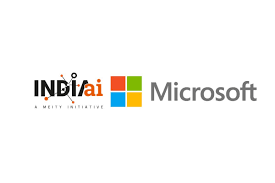
- 09 Jan 2025
In News:
IndiaAI, under the Digital India Corporation, has partnered with Microsoft to advance AI adoption in India for inclusive development and economic transformation. The collaboration focuses on skilling, innovation, AI safety, and responsible AI development, with a goal of fostering AI innovation across India, particularly in underserved rural and urban areas.
Key Highlights:
- Training 500,000 Individuals by 2026:
- Target Audience: Students, educators, developers, government officials, and women entrepreneurs.
- Goal: Empower these groups with foundational and advanced AI skills for economic opportunities and digital transformation.
- AI Catalysts (Centers of Excellence):
- Establishment of AI hubs in Tier 2 and Tier 3 cities to foster rural AI innovation.
- Objective to equip 100,000 AI innovators and developers through hackathons, community building, and creating an AI marketplace.
- AI Productivity Labs:
- Set up in 20 National Skill Training Institutes (NSTIs) across 10 states.
- Focus on training 20,000 educators and providing AI education to 100,000 students in 200 Industrial Training Institutes (ITIs).
- Support for Startups:
- Microsoft’s Founders Hub program will provide Azure credits, business resources, and mentorship to 1,000 AI startups in India, boosting innovation and growth in the Indian startup ecosystem.
- Development of Indic Language Models:
- Work on creating foundational AI models with support for Indic languages to address India’s linguistic diversity and cultural needs.
- AI Safety Institute:
- Focus on building frameworks, standards, and evaluation metrics for responsible AI development.
- Support for the creation of an AI Safety Institute in India to promote ethical and safe AI practices.
- Infrastructure & Research:
- Microsoft will also focus on enhancing cloud infrastructure and support for AI research through Microsoft Research India.
- AI-driven solutions will be developed for critical sectors like healthcare, education, and agriculture.
Investment and Strategic Goals:
- $3 Billion Investment:
- Microsoft has pledged $3 billion to expand AI and cloud infrastructure in India over the next 2 years. This investment will focus on:
- Building scalable infrastructure for AI applications.
- Enhancing cloud services and AI capabilities.
- Establishing new data centers across India, supporting the AI-first agenda.
- Microsoft has pledged $3 billion to expand AI and cloud infrastructure in India over the next 2 years. This investment will focus on:
- AI Skill Development:
- 10 million people will be trained over the next five years in AI skills, empowering the Indian workforce to adapt to AI technologies, driving job creation and economic growth.
- AI in India’s Economy:
- India aims to become a global leader in AI, with AI-powered solutions contributing to diverse sectors like finance, e-commerce, and manufacturing.
- Focus on economic growth through AI-powered industries and fostering entrepreneurship in underserved communities.
AI Technologies and Applications:
- Artificial Intelligence (AI) involves machines performing tasks that require human intelligence like decision-making, problem-solving, and learning from data.
- Machine Learning (ML): AI systems improve through data without being explicitly programmed.
- Natural Language Processing (NLP): AI systems understand and respond to human language.
- Computer Vision: AI systems analyze and interpret visual information.
- Robotics: AI powers automated tasks through robots in industries like manufacturing and healthcare.
- Cloud Infrastructure enables the scaling of AI systems:
- Cloud Computing provides on-demand access to computing power, essential for AI tasks requiring large amounts of data and processing power.
- Data Centers host AI models and data, and cloud services such as Microsoft Azure will support AI startups and businesses.
Expected Impact and Benefits:
- Inclusive AI Development: Focus on empowering women, students, and rural innovators to bridge the digital divide and promote economic empowerment.
- Startup Ecosystem: The collaboration will foster a robust AI startup ecosystem, promoting innovation and entrepreneurship through AI tools, Azure credits, and mentorship.
- Skill Development & Education: AI-driven skill training initiatives will prepare millions of individuals for the jobs of the future, particularly in the AI-driven economy, and support education reform.
- AI for Critical Sectors: Development of AI-enabled solutions to address challenges in sectors such as healthcare, education, and agriculture, driving social impact and economic growth.
Section 479 of the BNSS 2023

- 08 Jan 2025
In News:
Centre urges states, UTs to ensure undertrial prisoner relief in jails.
Key Highlights:
- Objective: The MHA has urged states and Union Territories (UTs) to implement provisions of Section 479 of the Bharatiya Nagarik Suraksha Sanhita (BNSS) 2023 to provide relief to undertrial prisoners (UTPs) in jails. This initiative aims to address issues such as long detention and overcrowding in prisons.
Key Provisions of Section 479 of BNSS, 2023
- Purpose: To offer relief to undertrial prisoners by mandating their release on bail or bond under specific conditions.
- Key Provisions:
- Subsection (1):
- Release on Bail: UTPs who have served half the maximum sentence for their offense (except offenses punishable by death or life imprisonment) are eligible for release on bail.
- Release on Bond for First-Time Offenders: First-time offenders, who have served one-third of the maximum sentence, are eligible for release on bond by the court.
- Subsection (3):
- Mandatory Application: It is the responsibility of the prison superintendent to apply to the concerned court for the release of eligible prisoners on bail or bond.
- Subsection (1):
- Superintendent’s Role:
- Prison superintendents are mandated to ensure timely applications for bail or bond are filed for eligible UTPs.
Implementation and Reporting
- MHA’s Advisory:
- On January 1, the MHA issued a letter to the Chief Secretaries, Director Generals, and Inspectors General of prisons in all states and UTs to ensure compliance with the provisions of Section 479 of BNSS.
- States and UTs were instructed to report the status of implementation in a prescribed format starting from January 1, 2025.
- Data to be Reported:
- First-Time UTPs: Number of first-time UTPs who have served one-third of their maximum sentence.
- Court Applications: Number of applications for bail filed by jail superintendents.
- Release on Bail: Number of UTPs released on bond or bail after meeting the eligibility criteria.
- Other UTPs: Number of UTPs who have completed half of their sentence, and the number of applications filed for their release.
- MHA’s Campaign:
- Launched on Constitution Day (November 26), this campaign encouraged states and UTs to identify eligible prisoners and file their bail applications, thus helping to reduce overcrowding in prisons and mitigate long-term detention.
Background and Context
- Why Section 479?
- Section 479 aims to reduce the prolonged detention of undertrials, some of whom may have already served significant portions of their maximum sentences. This will not only alleviate overcrowding in prisons but also expedite justice for prisoners who have spent extended periods in jail awaiting trial.
- Earlier MHA Initiatives:
- Prior to this directive, the MHA had issued an advisory on October 16, 2024, encouraging states and UTs to implement Section 479. A special push was also made during Constitution Day to move applications for the release of eligible prisoners.
- Expected Outcome:
- The measures are expected to significantly ease the challenges of overcrowded jails and provide timely relief to undertrials, especially first-time offenders. By enforcing these provisions, the government seeks to improve the judicial process for UTPs and contribute to a more effective and humane criminal justice system.
National Sports Awards 2024
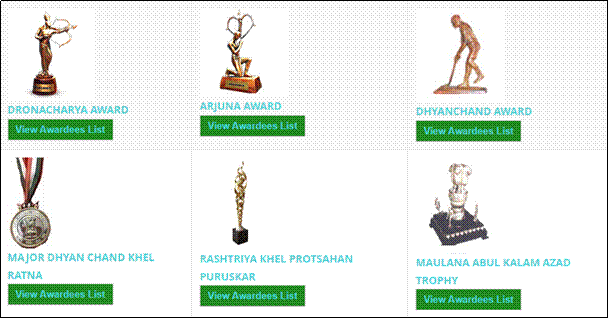
- 06 Jan 2025
In News:
The National Sports Awards 2024 were recently announced by the Ministry of Youth Affairs & Sports to celebrate excellence in Indian sports.
Key Highlights:
Major Dhyan Chand Khel Ratna Award
- This is India's highest sporting honor, renamed in 2021 after hockey legend Major Dhyan Chand.
- It’s awarded for exceptional performance in sports over a four-year period.
- 2024 Winners:
- Gukesh D (Chess)
- Harmanpreet Singh (Hockey)
- Praveen Kumar (Para-Athletics)
- Manu Bhaker (Shooting)
- The award includes a cash prize of Rs 25 lakh.
Arjuna Award
- Recognizes outstanding performance in sports over the previous four years and attributes like leadership, discipline, and sportsmanship.
- 2024 Winners: Various athletes across multiple disciplines received this honor.
Arjuna Award (Lifetime)
- Given to retired athletes who have not only excelled during their careers but also contributed to the promotion of sports post-retirement.
- 2024 Winners:
- Shri Sucha Singh (Athletics)
- Shri Murlikant Rajaram Petkar (Para-Swimming)
Dronacharya Award
- Given to coaches who have made a consistent and significant contribution by guiding sportspersons to excel at international events.
- The award includes a bronze statue of Dronacharya, a certificate, and a cash prize.
Maulana Abul Kalam Azad (MAKA) Trophy
- Awarded to the top-performing university in the Khelo India University Games.
- 2024 Winner: Chandigarh University.
Rashtriya Khel Protsahan Puruskar
- Recognizes individuals or organizations for their contribution to the promotion and development of sports.
- 2024 Winner: Physical Education Foundation of India.
These awards were selected by a committee led by Justice (Retd.) V. Ramasubramanian and include eminent sportspersons, journalists, and sports administrators. The winners will receive their awards from the President of India, marking a prestigious moment in Indian sports.
National e-Governance Awards (NAeG) Scheme 2025
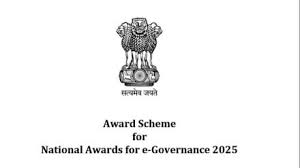
- 03 Jan 2025
In News:
- The Department of Administrative Reforms & Public Grievances (DARPG) has issued the guidelines for the 28th National e-Governance Awards (NAeG) 2025.
- Nominations for the awards can be submitted online via the official portal: www.nceg.gov.in.
Key Highlights:
- Award Categories: Nominations for the awards can be submitted under the following six categories:
- Government Process Re-engineering: Digital transformation through the use of technology to improve government processes.
- Innovation by Use of AI and New Age Technologies: Fostering citizen-centric services via artificial intelligence and other modern technologies.
- Best e-Gov Practices in Cyber Security: Recognizing excellence in e-Governance practices focused on cybersecurity.
- Grassroot Level Initiatives: Initiatives at the Districts, ULBs (Urban Local Bodies), or Gram Panchayats that deepen service delivery.
- Replication and Scaling Up of Successful Projects: Projects awarded in the past (such as NAeG or Prime Minister’s Awards) that have been successfully replicated or scaled.
- Digital Transformation using Data Analytics: Projects that leverage data analytics on digital platforms for enhancing governance.
- Eligibility: The awards are open to Central Ministries/Departments, State Governments, District Collectors, Research Institutions, and other relevant entities.
- Award Details:
- The NAeG 2025 will feature 16 awards:
- 10 Gold Awards.
- 6 Silver Awards.
- The NAeG 2025 will feature 16 awards:
- Incentives:
- Gold Award winners will receive a Trophy, Certificate, and an incentive of Rs 10 lakh.
- Silver Award winners will receive a Trophy, Certificate, and an incentive of Rs 5 lakh.
- The incentive will be used for further implementation of the awarded projects or bridging resource gaps in public welfare.
- Objective: The goal of the National Awards for e-Governance is to recognize and promote excellence in the implementation of e-Governance initiatives and digital transformation efforts across India.
Viksit Panchayat Karmayogi Initiative
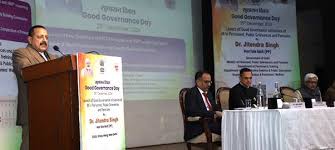
- 26 Dec 2024
In News:
On Good Governance Day, commemorating the 100th birth anniversary of former Prime Minister Atal Bihari Vajpayee, Dr. Jitendra Singh, the Union Minister of State for various departments, launched the ‘Viksit Panchayat Karmayogi’ initiative. This initiative is part of the broader ‘Prashasan Gaon Ki Aur’ campaign, which aims to empower Panchayati Raj Institutions (PRIs) at the grassroots level by enhancing the capacity and competence of elected representatives and officials.
Objective of the ‘Viksit Panchayat Karmayogi’ Initiative
The initiative seeks to strengthen PRIs by providing innovative tools and frameworks for capacity building and participatory governance. It will focus on equipping local leaders and officials with the necessary knowledge and tools to make effective decisions and implement sustainable development initiatives. Piloted in Odisha, Assam, Gujarat, and Andhra Pradesh, it uses e-learning platforms, AI-powered chatbots, and mobile apps to address knowledge gaps and improve service delivery at the local level. This program aligns with the government's mission to decentralize governance and promote citizen-centric and equitable development across rural India.
Other Key Initiatives Launched on Good Governance Day
- iGOT Karmayogi Platform Dashboard: A new dashboard on the iGOT Karmayogi platform, which empowers ministries, departments, and state administrators to monitor progress in capacity-building efforts. The enhanced dashboard includes customizable views, robust data filtering tools, and insights to optimize decision-making, marking the introduction of the 1600th e-learning course. This development is part of the Mission Karmayogi initiative to strengthen the civil service through continuous learning.
- CPGRAMS Annual Report 2024: The CPGRAMS Annual Report provided a review of the Centralized Public Grievance Redress and Monitoring System (CPGRAMS). This platform has been instrumental in resolving over 25 lakh grievances annually, leveraging advanced technologies and multilingual support. The report also highlighted the implementation of the Grievance Redressal Assessment and Index (GRAI), which has improved transparency, accountability, and the efficiency of public service delivery.
- Single Simplified Pension Application Form: A new digital pension system was launched, combining nine separate pension forms into a single, streamlined application. This digital transformation integrates e-HRMS with Bhavishya, reducing processing time and ensuring timely pension disbursement with real-time tracking and Aadhaar-based e-signatures. This system enhances the user experience for pensioners, making the process more efficient and transparent.
- Compendium of Pension Related Instructions 2024: Dr. Singh introduced a comprehensive Compendium of updated rules, procedures, and guidelines related to pensions. This document serves as a reference for pensioners and administrative personnel, ensuring clarity in the pension process and aligning with the government's vision of simplifying and streamlining pension systems.
Good Governance Day 2024 (Sushasan Diwas)
- Observed on: December 25 annually, marking the birth anniversary of Atal Bihari Vajpayee (1924–2018).
- Introduced in 2014: By the Bharatiya Janata Party (BJP) government under Prime Minister Narendra Modi.
- Purpose: To honor Vajpayee's contribution and promote good governance practices in India.
- Objective of Good Governance Day:
- Promote Government Accountability: Ensuring government actions and services are transparent and citizens benefit equally.
- Instill Good Governance Values: Encourages civil servants to practice effective and responsible governance.
- Bridge the Gap: Between citizens and the government through active participation.
- Theme for 2024: "India’s Path to a Viksit Bharat: Empowering Citizens through Good Governance and Digitalisation."
Center for Generative AI, Srijan
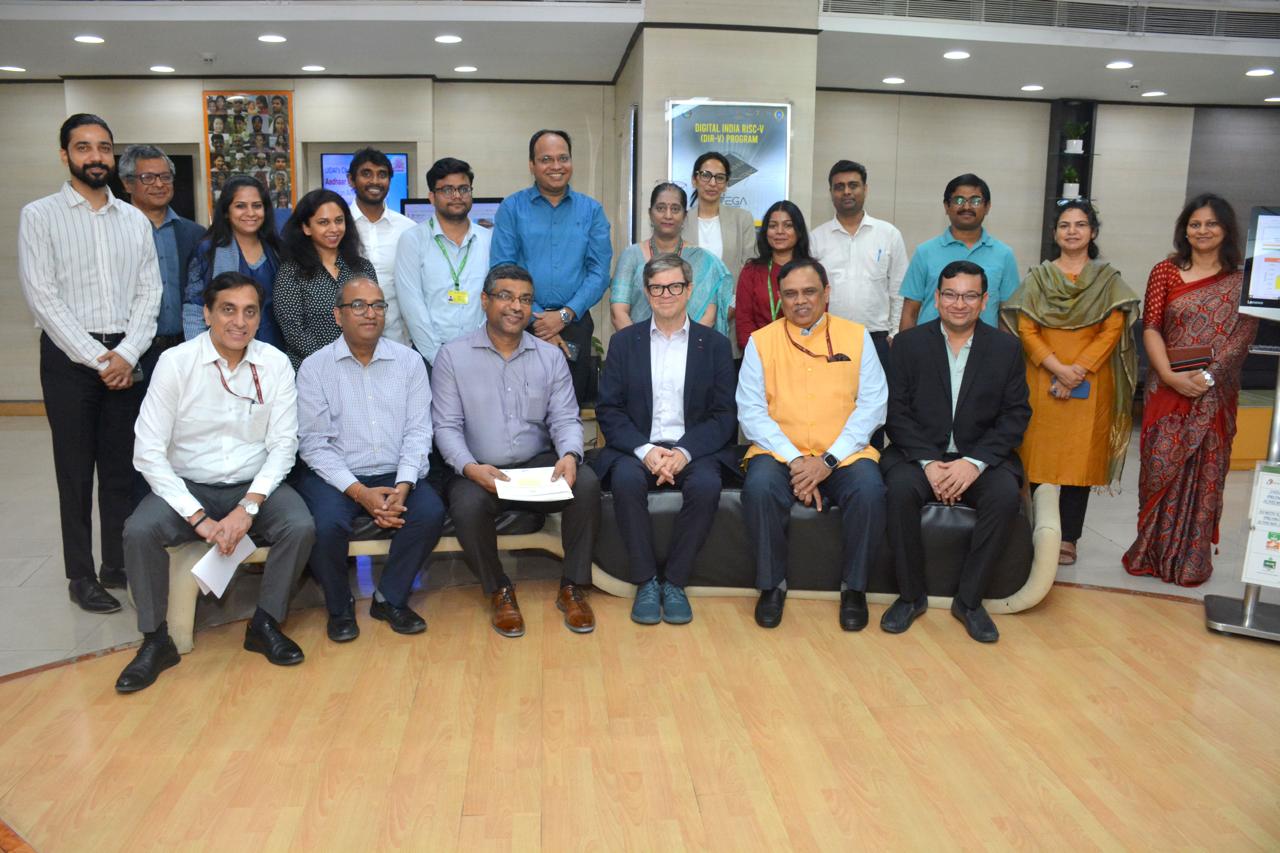
- 27 Oct 2024
In News:
IndiaAI and Meta have announced the establishment of the Center for Generative AI, Srijan (????) at IIT Jodhpur, along with the launch of the “YuvAi Initiative for Skilling and Capacity Building” in collaboration with the All India Council for Technical Education (AICTE), for the advancement of open source artificial intelligence (AI) in India.
Key Initiatives Launched
- Center for Generative AI, Srijan (????) at IIT Jodhpur:
- Focus on Generative AI (GenAI) research and innovation.
- Meta’s support for ethical and responsible development of AI technologies.
- Aim to empower researchers, students, and practitioners with the tools for responsible AI deployment.
- Focus Areas: Open science, AI policy advisory, and indigenous AI application development.
- YuvAi Initiative for Skilling and Capacity Building:
- Target: Empower 100,000 students and young developers (ages 18-30) with AI skills.
- Core Focus: Leveraging open-source Large Language Models (LLMs) for real-world solutions.
- Skills Development: Generative AI, open-source tools, and sector-specific AI applications (healthcare, education, agriculture, smart cities, mobility, and financial inclusion).
- Partnership: Collaboration with AICTE (All India Council for Technical Education).
Strategic Goals and Outcomes
- Research and Innovation:
- Strengthen India’s AI ecosystem through groundbreaking research and collaborations.
- Focus on open-source AI and indigenous AI solutions for national challenges.
- Empower India to lead in AI through ethical and responsible AI deployment.
- AI Talent Development:
- Bridge the AI talent gap by training young developers in open-source AI technologies.
- Develop AI solutions for critical sectors like healthcare, education, agriculture, smart cities, and financial inclusion.
- Program Components:
- GenAI Resource Hub with courses, case studies, and open datasets.
- Unleash LLM Hackathons for students to propose AI solutions for real-world challenges.
- Support for AI startups through an Innovation Accelerator.
Sectoral Focus and Impact
- Healthcare: AI for diagnostics, personalized medicine, and healthcare delivery.
- Education: AI tools for enhancing learning outcomes and personalized education.
- Agriculture: AI solutions for precision farming, pest control, and crop management.
- Smart Cities: AI in urban planning, traffic management, and public services.
- Mobility: AI applications in transportation, logistics, and urban mobility.
- Financial Inclusion: AI in fintech, digital payments, and financial services for underserved populations.
Additional Programs and Opportunities
- AICTE Collaboration: Mobilizing technical institutions across India to build AI capabilities.
- Master Training Activation Workshops: To introduce foundational AI concepts to students.
- Mentorship and Grants: Top AI solutions from hackathons will receive mentoring, seed grants, and market support.
- Student Startups: AI Innovation Accelerator will incubate 10 student-led AI startups experimenting with open-source models.
